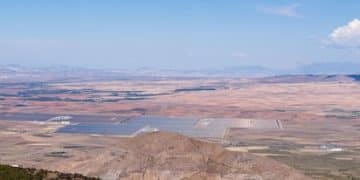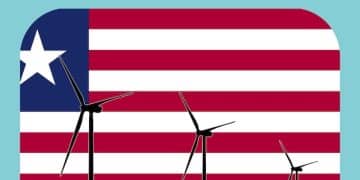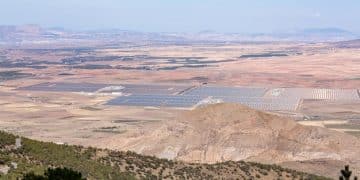Mexico’s Climate Stance: International Agreement Consequences

Mexico’s evolving stance on climate change, particularly its energy policies and less ambitious carbon reduction targets, presents significant challenges to the efficacy and cohesion of international climate agreements, potentially isolating the nation and undermining collective global efforts.
Exploring the Potential Consequences of Mexico’s Stance on Climate Change for International Agreements requires a nuanced look at its domestic priorities contrasting with global ecological imperatives. This complex interaction shapes not only Mexico’s future but also influences the broader landscape of international climate diplomacy.
Advertisements
Understanding Mexico’s Shifting Climate Policy Landscape
Mexico’s approach to climate change has seen various shifts, often reflecting a delicate balance between economic development, energy sovereignty, and environmental stewardship. Historically, Mexico was a proactive participant in early climate negotiations, even hosting COP16 in Cancún in 2010, demonstrating a previous commitment to global climate action. However, recent years have witnessed a notable recalibration of priorities, raising questions about the nation’s future role in international environmental governance. This evolving stance is crucial for understanding its potential impact on broader agreements.
The current administration has emphasized energy independence, often prioritizing state-owned energy companies like Pemex and CFE, and fossil fuel production over renewable energy expansion. This strategic pivot, while domestically driven by perceived economic stability and sovereignty, introduces complexities when viewed through the lens of global climate commitments. The rhetoric often champions self-sufficiency, yet this narrative sometimes diverges from the pressing need for decarbonization.
Historical context: Mexico’s early leadership
Mexico signed and ratified the UNFCCC and the Kyoto Protocol, and later the Paris Agreement, consistently pledging to reduce emissions. This early engagement positioned Mexico as a developing nation committed to climate action, often bridging gaps between developed and developing countries in negotiations. Its early nationally determined contributions (NDCs) under the Paris Agreement were considered quite ambitious for a developing economy. This historical record set an expectation for Mexico’s continued proactive role.
- 2010: Hosted COP16 in Cancún, playing a key role in the Cancún Agreements.
- 2015: Submitted an ambitious first NDC under the Paris Agreement.
- Pre-2018: Active development of renewable energy projects and climate legislation.
Current administration’s energy priorities
The current policy framework leans heavily towards strengthening state control over the energy sector. This includes efforts to bolster the production capabilities of fossil fuels and promote the use of conventional energy sources. Such policies are often justified by arguments of national energy security and affordability for the populace, particularly the lower income segments. This emphasis on fossil fuels has naturally led to concerns regarding the nation’s capacity or willingness to meet existing climate pledges. The shift is not merely economic but embodies a deeper philosophical stance on resource control and national development pathways.
The legislative and regulatory changes supporting this fossil-fuel-centric approach have faced opposition from environmental groups, international organizations, and even some within the business community who champion cleaner energy investments. The implications of this policy choice extend beyond domestic energy markets, potentially affecting international perception and collaborative efforts on climate.
Impact on Paris Agreement Commitments and NDCs
Mexico’s commitments under the Paris Agreement are enshrined in its Nationally Determined Contributions (NDCs), which outline its targets for reducing greenhouse gas emissions and adapting to climate change impacts. The integrity of the Paris Agreement hinges on countries not only making but also diligently pursuing increasingly ambitious NDCs. Any perceived backsliding by a significant economy like Mexico could set a troubling precedent for other nations, weakening the collective resolve required to meet global temperature goals.
In recent years, there has been a noticeable shift in Mexico’s reported ambitions. While not outright withdrawing from the agreement, the revised NDCs and domestic policy actions suggest a less aggressive pursuit of climate targets. This divergence creates a gap between its international obligations and internal policy implementation, prompting scrutiny from the global community. The revised targets have been criticized for being less ambitious than the initial pledges, raising questions about the nation’s long-term decarbonization pathway. This potential lack of ambition could erode trust among other signatories who are actively striving to meet their own commitments.
Revised NDCs: A step back?
Mexico initially submitted an NDC in 2015 that pledged an unconditional 22% reduction in greenhouse gases and a 30% reduction in black carbon by 2030, relative to a business-as-usual scenario. A conditional target of 36% for GHGs and 70% for black carbon was also included. However, an updated NDC submitted in 2020 was widely criticized for seemingly lowering the ambition, despite being presented as an update. The targets were rephrased and, when analyzed, appeared to allow for higher emissions than the original targets. This perceived lack of ambition, or even regression, has directly fueled concerns about the country’s commitment to the Paris Agreement’s long-term objectives.
The methodology and baseline assumptions in the updated NDC have been subjects of debate, with many experts arguing that it does not represent an enhanced contribution as called for by the Paris Agreement’s ratchet mechanism. This mechanism is designed to encourage increasingly ambitious climate action over time, a principle seemingly undercut by Mexico’s latest submission.
Challenges to emission reduction targets
Achieving emission reduction targets is not merely about setting them but implementing concrete policies and investments. Mexico faces several internal challenges in this regard. The heavy reliance on fossil fuels for electricity generation, the reluctance to invest in large-scale renewable projects, and the continued support for fuel subsidies all contribute to a difficult environment for decarbonization.
Furthermore, economic pressures and social considerations, such as energy affordability, often weigh heavily on policy decisions. The transition to a low-carbon economy requires substantial investment, technological innovation, and a fundamental restructuring of energy systems, all of which pose significant hurdles for Mexico given its current economic and political landscapes. The intertwining of energy policy with national sovereignty objectives further complicates the implementation of aggressive emission reduction strategies.
Consequences for International Cooperation and Reputation
In the realm of global climate action, a nation’s stance has ripple effects extending far beyond its borders. Mexico, as a G20 economy and a significant emitter, carries weight in multilateral environmental forums. Its perceived wavering or limited ambition on climate commitments can consequently diminish its leverage and influence in international negotiations, affecting its ability to shape future global climate policy and environmental agendas. This could lead to a less central role in discussions where it once was a prominent voice among developing nations.
A country’s engagement in international agreements is also heavily linked to its global reputation. Nations are increasingly judged by their environmental records, and a perceived lack of commitment to climate targets can lead to reputational damage. This damage might manifest as reduced foreign investment in green technologies, strained diplomatic relations with climate-forward nations, or even a decreased standing in international organizations. For Mexico, which has historically prided itself on its multilateral engagement and bridging role, such a shift could be particularly impactful. The erosion of trust from international partners could also jeopardize access to climate finance and technology transfer, crucial for its own sustainable development.
Loss of diplomatic leverage
Mexico has historically been a strong voice at international climate conferences, often mediating between developed and developing nations. This diplomatic leverage was built on a foundation of perceived commitment and proactive engagement. However, if its domestic climate policies are seen as undermining international efforts, this influence could wane significantly. Without a credible domestic climate agenda, Mexico’s ability to advocate for its national interests in global climate forums, such as access to climate finance or technology, might be considerably weakened. Other nations may become less receptive to Mexico’s proposals or concerns if they perceive a double standard between its rhetoric and its actions.
Furthermore, reduced influence on the global stage could mean Mexico has less say in determining the architecture of future climate agreements, potentially leaving it subject to decisions made by others without its input fully considered. This could be a substantial strategic setback for a nation that seeks to play an active, autonomous role in global affairs.
Risk of isolation and strained relations
A more insular climate policy, prioritizing domestic fossil fuel production over international climate collaboration, could lead to Mexico’s increasing isolation within global climate alliances. This isolation poses risks to diplomatic relations, particularly with trading partners and key allies who are more aggressively pursuing decarbonization. Trade disputes related to carbon tariffs or environmental standards could emerge, impacting Mexico’s export-oriented economy. Such policies might also complicate Mexico’s participation in regional initiatives aimed at promoting sustainable development and clean energy technologies.
- Reduced eligibility for climate finance from multilateral development banks.
- Potential trade barriers from countries implementing carbon border adjustments.
- Strained relations with key partners like the EU, Canada, and the US regarding renewable energy investments.
This potential for strained relations could extend beyond purely environmental matters, impacting broader diplomatic and economic ties. The international community often looks for consistent messaging and actions from its partners, and a perceived inconsistency in Mexico’s climate stance could lead to deeper mistrust and a less collaborative environment.

Economic Implications and Investment Climate
The economic landscape of a country is intrinsically linked to its environmental policies, particularly in an era dominated by global sustainability trends. For Mexico, the shift in climate stance carries significant economic implications, affecting everything from foreign direct investment to its competitiveness in emerging green markets. A policy environment that favors fossil fuels over renewables can create uncertainty for investors looking to capitalize on global decarbonization trends, potentially diverting capital to more predictable and greener economies.
Moreover, a reduced commitment to climate action might limit Mexico’s access to “green finance” and international funds specifically allocated for climate mitigation and adaptation projects. These funds are often crucial for developing nations to transition to cleaner economies without hindering their development goals. The long-term economic consequences of prioritizing a fossil-fuel-centric energy model in a world moving towards renewables could include diminished returns from outdated infrastructure, increased costs associated with climate impacts, and a reduced capacity to compete in future low-carbon global markets.
Deterrence of green foreign direct investment
Countries committed to ambitious climate goals are increasingly attractive destinations for foreign direct investment (FDI) in renewable energy, sustainable infrastructure, and green technologies. Mexico’s current energy policies, which have been criticized for creating an uneven playing field that favors state-owned utilities and fossil fuels, can deter such investments. Uncertainty regarding regulatory frameworks, changes to energy auction mechanisms, and challenges to independent power producers can make the Mexican market less appealing to international companies seeking predictable and supportive environments for green projects. This directly impacts the nation’s ability to attract the capital and expertise necessary for a rapid energy transition.
The perception of an unstable regulatory environment for renewable energy projects, coupled with a preference for conventional energy sources, sends a signal to potential investors that aligns Mexico less with future-oriented, sustainable economies. This can have a lasting impact on its position in the global green economy.
Access to climate finance and technology transfer
International climate finance, provided by developed nations and multilateral institutions, is critical for supporting developing countries in their climate action efforts. This funding often comes with conditions, including a demonstrated commitment to emission reduction and adaptation strategies. If Mexico’s climate policies are perceived as less ambitious or even contradictory to global climate goals, its eligibility for and access to such crucial financial resources may be compromised. Simultaneously, technology transfer—the sharing of innovative low-carbon technologies—is often facilitated through international partnerships and agreements. A strained relationship due to climate policy could hinder Mexico’s ability to acquire and deploy cutting-edge clean energy technologies, slowing its own decarbonization process.
The interdependency of climate finance and policy alignment means that a country’s climate stance is not just an environmental issue but a fundamental economic one, affecting its financial well-being and technological advancement.
Environmental Justice and Domestic Implications
The pursuit of specific energy policies often has profound implications for environmental justice within a nation, impacting different communities disproportionately. In Mexico, the continued reliance on fossil fuels, coupled with a potentially softer stance on environmental regulations, can exacerbate existing environmental inequalities. Vulnerable communities, often those already marginalized, bear the brunt of pollution from fossil fuel extraction and combustion, facing higher risks of respiratory illnesses, water contamination, and land degradation. This raises ethical questions about equity in the context of national development.
Beyond direct pollution, the broader domestic implications of Mexico’s climate stance include its ability to adapt to the accelerating impacts of climate change. A less ambitious mitigation strategy domestically could expose its population, ecosystems, and economy to more severe consequences, ranging from extreme weather events to agricultural disruptions and water scarcity. This underscores the internal cost of inaction, which often manifests in public health crises, mass migrations, and increased pressure on social services. Addressing environmental justice issues becomes increasingly challenging without a robust national climate action framework.
Unequal distribution of environmental burdens
The emphasis on fossil fuel production and consumption often concentrates polluting industries in specific regions, disproportionately affecting indigenous communities, rural populations, and low-income urban areas. These communities frequently lack the political power and resources to effectively resist the siting of polluting facilities or to demand adequate compensation for environmental damages. The result is an uneven distribution of environmental burdens, where the economic benefits of fossil fuels accrue broadly, but environmental costs are localized among the most vulnerable. This creates deeply entrenched social justice issues.
For example, increased oil and gas production can lead to spills, air pollution, and disruption of traditional livelihoods, while coal-fired power plants can contaminate local air and water sources. Without strong environmental regulations and enforcement, these burdens are amplified, perpetuating a cycle of poverty and poor health outcomes in affected areas.
Vulnerability to climate change impacts
Mexico is highly vulnerable to the adverse effects of climate change, including more frequent and intense droughts, heatwaves, hurricanes, and rising sea levels. A national climate stance that neglects aggressive mitigation efforts internally increases the country’s exposure to these hazards. A less ambitious climate policy delays necessary investments in resilient infrastructure, early warning systems, and climate-smart agriculture. This puts populations and economic sectors at greater risk.
- Water Scarcity: Intensified droughts affecting agriculture and urban water supply.
- Extreme Weather: Increased frequency and intensity of hurricanes and tropical storms, causing widespread damage.
- Food Security: Impacts on staple crops leading to potential food shortages and price hikes.
- Public Health: Heat-related illnesses and spread of vector-borne diseases due to rising temperatures.
Inaction at the national level means that Mexico’s ability to adapt and protect its citizens from these impacts is diminished, potentially leading to humanitarian crises and significant economic losses in the long run. The absence of a strong mitigation strategy exacerbates the need for more urgent, and often more costly, adaptation measures in the future.

The Role of Civil Society and International Pressure
In many countries, civil society organizations play a pivotal role in shaping environmental policy, acting as watchdogs, advocates, and educators. In Mexico, environmental groups, indigenous communities, and academic institutions have been vocal critics of the current administration’s climate and energy policies. They engage in various forms of advocacy, from legal challenges to public awareness campaigns, aiming to hold the government accountable to its domestic and international commitments. Their efforts often serve as a crucial counter-balance to governmental decisions that appear to prioritize short-term economic gains over long-term environmental sustainability.
Parallel to domestic advocacy, international pressure and engagement from global bodies and other nations also significantly influence a country’s climate actions. Multilateral organizations, environmental NGOs, and even foreign governments often voice their concerns or offer support for more ambitious climate policies. This external pressure can come in various forms, including diplomatic dialogues, public statements, and even conditions on international aid or trade agreements. For Mexico, the intersection of robust domestic civil society activism and international scrutiny creates a complex dynamic that can either push for greater climate ambition or reveal deeper fissures in its global and local environmental governance strategies.
Domestic activism and advocacy
Mexican civil society organizations, environmental activists, and academic researchers have been at the forefront of challenging the country’s current energy and climate direction. They employ a range of tactics, including legal actions against specific energy policies that they argue violate Mexico’s clean energy transition laws or international commitments. Public awareness campaigns aim to inform citizens about the health and environmental risks associated with fossil fuels and the benefits of renewable energy. These groups frequently publish reports, host forums, and engage with media to keep climate issues in the public discourse, pressing for greater transparency and accountability from authorities.
Their efforts often highlight the inconsistencies between Mexico’s international climate pledges and its domestic energy policies, providing crucial data and analysis that inform public debate and shape international perceptions. Their persistent advocacy is a vital component of the checks and balances necessary for a democratic society to address complex environmental challenges effectively.
International environmental organizations and foreign governments
International environmental organizations, such as Greenpeace, the World Wildlife Fund (WWF), and the Environmental Defense Fund, maintain a presence or engagement in Mexico, often collaborating with local groups. They leverage their global reach and expertise to amplify concerns about Mexico’s climate policies on the international stage. These organizations frequently issue reports, engage with international media, and lobby at global forums like climate COPs to highlight perceived shortcomings in Mexico’s climate action.
Foreign governments, particularly those of key trading partners and allies, also exert influence. The United States and Canada, for example, have expressed concerns regarding Mexican energy policies, citing potential impacts on cross-border climate cooperation and investment. The European Union, with its ambitious Green Deal, also pays close attention to the climate policies of its trading partners. This international scrutiny, whether through formal diplomatic channels or public statements, can create significant pressure on Mexico to align more closely with global climate objectives and uphold its commitments.
Future Scenarios and Pathways for Engagement
Considering the current trajectory, various future scenarios could unfold concerning Mexico’s stance on climate change and its implications for international agreements. One scenario suggests a continued path where domestic energy sovereignty might outweigh ambitious climate action, leading to further isolation from climate-forward nations and a diminished role in global climate diplomacy. This could result in fewer international partnerships for green technology and finance, potentially slowing Mexico’s own sustainable development.
Alternatively, pressures—both domestic and international—could lead to a recalibration of Mexico’s energy and climate policies. A shift towards greater alignment with global climate goals could reopen avenues for collaboration, investment in renewables, and a return to a more prominent role in international climate negotiations. This would require significant policy adjustments, including a clearer commitment to renewable energy targets and perhaps a re-evaluation of fossil fuel subsidies. The path Mexico chooses will have lasting consequences not only for its own environmental and economic future but also for the broader effectiveness of international efforts to combat global warming. The balance between national interest and global responsibility remains central to this evolving narrative.
Potential for increased isolation or compliance
The most stark future scenario involves Mexico either doubling down on its current energy strategy or yielding to mounting pressure. If Mexico continues to prioritize fossil fuels and maintains less ambitious NDCs, it risks further isolation from climate-leading nations and potentially faces trade consequences, such as carbon border adjustment mechanisms. This could negatively impact its export economy and limit access to green markets. Conversely, if internal and external pressures intensify enough, Mexico might choose a path of greater compliance. This would entail aligning its energy policy more closely with its international climate commitments, possibly through enhanced renewable energy targets, a phase-out of fossil fuel subsidies, and more robust environmental regulations. Such a shift would likely be driven by a combination of economic incentives (e.g., access to green finance, increased FDI in renewables) and diplomatic considerations.
The outcome will depend heavily on the perceived costs and benefits of each path, as weighed by decision-makers in Mexico and influenced by the global geopolitical and economic climate.
Pathways for enhanced international collaboration
Despite current challenges, several pathways exist for Mexico to enhance its international climate collaboration. Reengaging with international partners on a more ambitious climate agenda could unlock significant opportunities. This could include participating more actively in regional initiatives with the United States and Canada on clean energy transition, leveraging North American trade agreements to foster green industries, and seeking partnerships with the European Union for technology transfer and investment in sustainable projects. Mexico could also play a crucial role in South-South cooperation, sharing its experience in climate adaptation and sustainable development with other developing nations.
Furthermore, a renewed focus on its 2030 Agenda for Sustainable Development goals, which intrinsically link with climate action, could provide a domestic framework for international engagement. These pathways would require a policy shift towards creating a more attractive and stable regulatory environment for renewable energy and embracing a long-term vision for a decarbonized economy. Embracing these opportunities could re-establish Mexico as a key player in the global climate fight, benefiting both its own citizens and the international community.
| Key Point | Brief Description |
|---|---|
| 🌍 Shifting Stance | Mexico’s recent energy policies prioritize fossil fuels, diverging from earlier climate leadership. |
| 📉 NDC Impact | Revised Nationally Determined Contributions (NDCs) are seen as less ambitious. |
| 🤝 Deterred Investment | Preference for fossil fuels deters green foreign direct investment. |
| ⚖️ Justice Concerns | Domestic fossil fuel reliance raises environmental justice issues for vulnerable communities. |
Frequently Asked Questions about Mexico’s Climate Stance
▼
Mexico’s current administration prioritizes energy sovereignty and strengthening state-owned energy companies, primarily through increased fossil fuel production and reduced emphasis on private renewable energy investment. This policy aims to ensure national energy independence and affordability.
▼
Mexico’s updated Nationally Determined Contributions (NDCs) under the Paris Agreement have been criticized as less ambitious than previous pledges. This perceived step backward has raised concerns among international partners, potentially diminishing Mexico’s diplomatic leverage and reputation in global climate forums.
▼
Continued reliance on fossil fuels risks deterring green foreign direct investment, limiting access to international climate finance, and making Mexico less competitive in the global green economy. It could also lead to future trade barriers imposed by countries implementing carbon-related tariffs, impacting exports.
▼
A policy favoring fossil fuels can exacerbate environmental justice issues, as pollution from extraction and combustion disproportionately affects marginalized communities. This leads to unequal distribution of environmental burdens and increased health risks for vulnerable populations within Mexico.
▼
Yes, civil society organizations in Mexico and international environmental and governmental bodies play a significant role. Through legal challenges, advocacy, and diplomatic pressure, they aim to hold Mexico accountable to its climate commitments, potentially encouraging a shift towards more ambitious and sustainable policies.
Conclusion
Mexico’s evolving climate stance, characterized by a renewed emphasis on fossil fuel sovereignty, presents a complex challenge to its international climate commitments and global environmental efforts. While domestic priorities are understandable, the potential consequences—including diminished diplomatic leverage, strained international relations, deterred green investment, and increased domestic environmental burdens—underscore the interconnectedness of national policy and global climate action. As international pressure and civil society engagement continue, the path Mexico chooses will significantly determine its future role in combating climate change and shaping a sustainable trajectory for its people and the planet. Ultimately, striking a balance between national aspirations and global imperatives will be crucial for Mexico’s long-term prosperity and its standing in the international community.





